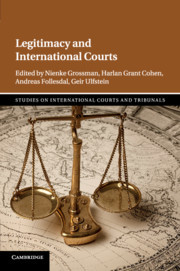Description
Legitimacy and International Courts
Studies on International Courts and Tribunals Series
Coordinators: Grossman Nienke, Cohen Harlan Grant, Follesdal Andreas, Ulfstein Geir
An interdisciplinary volume exploring the concept of legitimacy in relation to international courts and what can drive and weaken it.
Language: English
Subject for Legitimacy and International Courts:
Legitimacy and International Courts
Publication date: 01-2020
Support: Print on demand
Publication date: 01-2020
Support: Print on demand
Legitimacy and International Courts
Publication date: 02-2018
396 p. · 15.8x23.5 cm · Hardback
Publication date: 02-2018
396 p. · 15.8x23.5 cm · Hardback
Description
/li>Contents
/li>Biography
/li>
One of the most noted developments in international law over the past twenty years is the proliferation of international courts and tribunals. They decide who has the right to exploit natural resources, define the scope of human rights, delimit international boundaries and determine when the use of force is prohibited. As the number and influence of international courts grow, so too do challenges to their legitimacy. This volume provides new interdisciplinary insights into international courts' legitimacy: what drives and undermines the legitimacy of these bodies? How do drivers change depending on the court concerned? What is the link between legitimacy, democracy, effectiveness and justice? Top international experts analyse legitimacy for specific international courts, as well as the links between legitimacy and cross-cutting themes. Failure to understand and respond to legitimacy concerns can endanger both the courts and the law they interpret and apply.
1. Introduction; Part I. The Legitimacy of Particular Dispute Settlement Mechanisms: 2. Solomonic judgements and the legitimacy of the international court of justice; 3. The global-local dilemma and the ICC's legitimacy; 4. Justice as legitimacy in the European Court of Human Rights; 5. Legitimacy and jurisdictional overlap: the ICC and the inter-American court in Colombia; 6. The legitimacy of the European Court of Justice: normative debates and empirical evidence; 7. The international tribunal for the law of the sea: seeking the legitimacy of state consent; 8. Who decides matters: the legitimacy capital of WTO adjudicators versus ICSID arbitrators; 9. The legitimacy of the International Centre for Settlement of Investment Disputes; 10. The Human Rights Treaty Bodies and legitimacy challenges; Part II. Legitimacy - Cross-Cutting Issues: 11. Constitutionalization, not democratization: how to assess the legitimacy of international courts; 12. Democracy, justice and the legitimacy of international courts; 13. Stronger together? Legitimacy and effectiveness of international courts as mutually reinforcing or undermining notions.
Harlan Grant Cohen holds the Gabriel M. Wilner/UGA Foundation Professorship in International Law at the University of Georgia School of Law.
Andreas Føllesdal is Professor of Political Philosophy in the Faculty of Law and Co-director of PluriCourts, a Centre for the Study of the Legitimate Roles of the Judiciary in the Global Order, at the Universitetet i Oslo.
Nienke Grossman is an Associate Professor of Law and Deputy Director of the Center for International and Comparative Law at the University of Baltimore School of Law.
Geir Ulfstein is Professor of International Law in the Department of Public and International Law and Co-director of PluriCourts, a Centre for the Study of the Legitimate Roles of the Judiciary in the Global Order, at the Universitetet i Oslo.
Andreas Føllesdal is Professor of Political Philosophy in the Faculty of Law and Co-director of PluriCourts, a Centre for the Study of the Legitimate Roles of the Judiciary in the Global Order, at the Universitetet i Oslo.
Nienke Grossman is an Associate Professor of Law and Deputy Director of the Center for International and Comparative Law at the University of Baltimore School of Law.
Geir Ulfstein is Professor of International Law in the Department of Public and International Law and Co-director of PluriCourts, a Centre for the Study of the Legitimate Roles of the Judiciary in the Global Order, at the Universitetet i Oslo.
© 2024 LAVOISIER S.A.S.




